|
|
|
Sort Order |
|
|
|
Items / Page
|
|
|
|
|
|
|
| Srl | Item |
| 1 |
ID:
101138
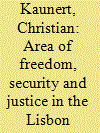

|
|
|
|
|
| Publication |
2010.
|
| Summary/Abstract |
Scholars may rightly claim the European Union's (EU) area of freedom, security and justice (AFSJ) has become one of the most significant developments in the European integration process. The Lisbon Treaty (LT) has the potential to push the AFSJ towards tremendous growth, and has provided the policy area with instruments that were unthinkable after the third pillar was created during the Maastricht Treaty negotiations. This article investigates the role of the European Commission in the process of constructing an 'AFSJ'. It argues that the Commission (through alliances with other institutional actors) managed to incrementally contribute to this shift in political norms. This shift derived from the policy-making level from 1999 onwards. It manifested itself specifically during the negotiations of the Constitutional Treaty (CT) and the subsequent re-negotiation of the LT. Here, the Commission acted with the support and the use of other supranational actors during the Convention, without which this result would have been difficult, if not impossible, to obtain. Firstly, the article will deal with the main advances of the CT which resulted in the LT. Subsequently, the role of the Commission and other EU institutional actors will be examined, resulting in an overall evaluation.
|
|
|
|
|
|
|
|
|
|
|
|
|
|
|
|
| 2 |
ID:
154838
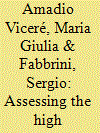

|
|
|
|
|
| Summary/Abstract |
The 2009 Lisbon Treaty institutionalised an intergovernmental constitution for managing policies traditionally a matter of national sovereignty, such as foreign and defence policies. However, important innovations were introduced in the foreign policymaking structure to limit its intergovernmental logic, in particular, with regard to the role of the High Representative (HR). It was generally assumed that those innovations would have made development of a coherent EU foreign policy possible. Yet, in one of the most significant tests for the EU’s foreign and defence policies in the post-Lisbon era, namely the Egyptian crisis (2011-14), those reforms did not work as expected. Notwithstanding the innovations, the HR’s role was diminished by the European Council’s strict control over foreign policy toward Egypt. The lack of clear policy guidelines towards the issue of democratisation in the Arab world in the 2003 European Security Strategy, although partially mitigated by the European Neighbourhood Policy and the Barcelona Process/Union for the Mediterranean, made it even more difficult for the HR to bring a European perspective into the largely intergovernmental setting.
|
|
|
|
|
|
|
|
|
|
|
|
|
|
|
|
| 3 |
ID:
102656
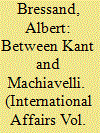

|
|
|
|
|
| Publication |
2011.
|
| Summary/Abstract |
The entry into force of the Lisbon Treaty invites and enables Europe to develop elements of a common foreign policy. Europe should resist the tendency of listing all issues calling for attention, and be aware that it will have to address three agendas, not just one. The first agenda is the Kantian one of universal causes. While it remains essential to European identity, it presents Europe with limited opportunities for success in the 2010s as could be seen at the 2009 Climate Summit in Copenhagen. The 'Alliance' agenda remains essential on the security front and would benefit from a transatlantic effort at rejuvenation on the economic one. Last but not least, the 'Machiavellian' agenda reflects what most countries would define as their 'normal' foreign policy. It calls for Europe to influence key aspects of the world order in the absence of universal causes or common values. While Europe's 'Machiavellian' experience is limited to trade policy, developing a capacity to address this third agenda in a manner that places its common interests first and reinforces its identity will be Europe's central foreign policy challenge in the 2010s. A key part of the Machiavellian agenda presently revolves around relations with Ukraine, Turkey and the Russian Federation, three countries essential to Europe's energy security that are unlikely to change their foreign policy stance faced with EU soft power. Stressing that foreign policy is about 'us' and 'them', the article looks at what could be a genuine European foreign policy vis-à-vis each of these interdependent countries, beginning with energy and a more self-interested approach to enlargement. The European public space is political in nature, as majority voting and mutual recognition imply that citizens accept 'foreigners' as legitimate legislators. At a time when the European integration process has become more hesitant and the political dimension of European integration tends to be derided or assumed away, admitting Turkey or Ukraine as members would change Europe more than it would change these countries. Foreign policy cannot be reduced to making Europe itself the prize of the relationship. What objectives Europe sets for itself in its dealing with Ukraine, Turkey and Russia will test whether it is ready for a fully-fledged foreign policy or whether the invocation of 'Europe' is merely a convenient instrument for entities other than 'Europe'.
|
|
|
|
|
|
|
|
|
|
|
|
|
|
|
|
| 4 |
ID:
120540
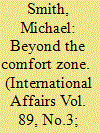

|
|
|
|
|
| Publication |
2013.
|
| Summary/Abstract |
This article explores the extent to which the European Union (EU) has responded effectively to the rising powers of Asia, Latin America and Africa, and whether the Union has been able to construct an effective diplomacy for dealing with them.
It starts from the observation that the EU has significantly developed its diplomatic apparatus since the Lisbon Treaty, and that this apparatus is largely directed towards the establishment of negotiated order at the regional and global levels. The article identifies a number of tensions and contradictions that arise from the EU's status and role in the global arena and that feed into its quest for negotiated order.
It goes on to assess the challenges to EU positions and strategies that arise not only from the emergence of new powers in the world arena, but also from the changes in global structures and processes that accompany this development.
The article then investigates how these challenges have interacted with the search for negotiated order in a series of issue areas: security, commercial policy, development, environment and energy. It argues that in recent years the EU has, in a variety of ways, been taken outside its comfort zone and that while the European Union can and must seek to re-establish negotiated order in its external relations, the challenge of doing so is severe.
|
|
|
|
|
|
|
|
|
|
|
|
|
|
|
|
| 5 |
ID:
150186
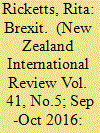

|
|
|
| 6 |
ID:
154053
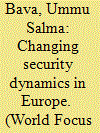

|
|
|
|
|
| Summary/Abstract |
The article examines how the end of Cold War transformed Europe and the changing security dynamics in context of the European Union (EU). Divided into three parts: i) the Post-Cold War period, 1990 - 2000, (ii) the post 9/11 period- 2000-2009, (iii) Lisbon and the Global Strategy: the way ahead, 2009- it locates how the in the backdrop of global security developments, the EU has responded to the changing nature of threats to transform itself into a security actor.
|
|
|
|
|
|
|
|
|
|
|
|
|
|
|
|
| 7 |
ID:
115993
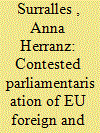

|
|
|
|
|
| Publication |
Frankfurt, Peace Research Institute frankfurt, 2011.
|
| Description |
36p.
|
| Series |
PRIF Report No.104
|
| Standard Number |
9783942532235
|
|
|
|
|
|
|
|
|
|
|
|
Copies: C:1/I:0,R:0,Q:0
Circulation
| Accession# | Call# | Current Location | Status | Policy | Location |
| 056940 | 341.026/SUR 056940 | Main | On Shelf | General | |
|
|
|
|
| 8 |
ID:
103198
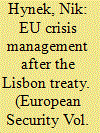

|
|
|
|
|
| Publication |
2011.
|
| Summary/Abstract |
The presented article focuses on key issues and developments in the European Union (EU)'s comprehensive crisis management planning, civil-military coordination and cooperation, as well as the future of the EU Operational Headquarters (OHQ). The article begins with a short overview of key changes in the EU's external action after the Lisbon Treaty, and focuses on the area of Common Foreign and Security Policy (CFSP) and Common Security and Defence Policy (CSDP). The impact of the European External Action Service on CSDP-CFSP cooperation in planning and on EU's crisis management is being examined. Further on, the article continues by addressing the issue area of EU crisis management. After the evolution of the concept and practice at the EU level is examined and different phases are discussed, the article analyses the main political, strategic and operational trends in this field. Indeed, this part reflects on the implications of the Lisbon Treaty for crisis management. What follows is an assessment of the civil-military coordination in the EU's crisis management structures. In order to contextualise the most recent transformations that are investigated at length, basic concepts and terms are outlined, and the evolution of civil-military coordination at the EU level is presented. The final substantive part tackles current and future EU OHQ options. After the necessary contextualisation, the characteristics and shortcomings of the three current options are analysed, and based on these limits, the case for the establishment of a permanent strategic planning and conduct structure in Brussels is put forward. Finally, concluding remarks and recommendations are attached.
|
|
|
|
|
|
|
|
|
|
|
|
|
|
|
|
| 9 |
ID:
108774
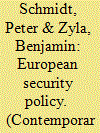

|
|
|
|
|
| Publication |
2011.
|
| Summary/Abstract |
With the Lisbon Treaty in place and the European Union increasingly involved in crisis management and stabilization in places near and far, this Special Issue examines whether European security behaviour is evidence of an actual strategic culture. Contrary to prevailing scholarship on the subject, this volume demonstrates that strategic culture, as an analytical tool and force on European strategic goals and conduct, is far from conclusive. Ostensibly, the development of a security culture was a major lever by which the European Union's principal planning document, the European Security Strategy of 2003, tried to guide the European Union's role in international security. This volume revisits the trajectory of the concept of strategic culture and examines its application in a variety of circumstances, especially operations in Africa and the Balkans, including joint operations with NATO and the United Nations. The contributors to this Special Issue find that strategic culture is a useful tool to understand EU's operations, not in the sense of a 'cause', but as a uniquely European normative framework of preferences and constraints. Classical notions of strategic culture must be adapted to highlight the specific evolution of Europe's strategic culture. Though at variance over the extent to which security and defense missions have promoted a shared strategic culture in Europe, the authors in this Special Issue reveal a growing sense that a strategic culture is critical for European ambition as a global actor. Should Europe fail to nurture a shared strategic culture, its ambitions and the normative framework that underpins it will unravel.
|
|
|
|
|
|
|
|
|
|
|
|
|
|
|
|
| 10 |
ID:
140436
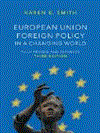

|
|
|
|
|
| Edition |
3rd ed.
|
| Publication |
Cambridge, Polity Press, 2014.
|
| Description |
xiii, 292p.: tables, boxes, abbre.pbk
|
| Standard Number |
9780745664705
|
|
|
|
|
|
|
|
|
|
|
|
Copies: C:1/I:0,R:0,Q:0
Circulation
| Accession# | Call# | Current Location | Status | Policy | Location |
| 058284 | 327.14/SMI 058284 | Main | On Shelf | General | |
|
|
|
|
| 11 |
ID:
116193
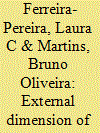

|
|
|
|
|
| Publication |
2012.
|
| Summary/Abstract |
Having recently completed its first decade of existence, the EU's counter-terrorism policy has been receiving increasing scholarly attention as reflected in the specialized literature devoted to this emerging policy area. Its external dimension, nevertheless, has not been the subject of thorough and systematic analyses which scrutinize its characteristic features and principal actors, policies and interests. Against this backdrop, the introductory article of this Special Issue aims at providing a contextualised assessment of the external dimension of EU counter-terrorism while discussing the impact of the Lisbon Treaty upon this policy field. It proceeds with an examination of the policies, interests and actorness dynamics associated with the EU's counter-terrorism policy in highlighting the major findings and conclusions conveyed by the five contributions to this Special Issue. Its conclusion points to possible avenues for future research on the basis of identified underdeveloped topics, under-theorised aspects and neglected issues in the existing literature.
|
|
|
|
|
|
|
|
|
|
|
|
|
|
|
|
| 12 |
ID:
119891
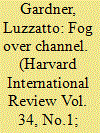

|
|
|
|
|
| Publication |
2012.
|
| Summary/Abstract |
On October 22, 1957, a London Times headline declared: "Heavy Fog in Channel - Continent Cut Off." Britain's tabloid press displayed similar insularity in early December, 2011 after Prime Minister David Cameron vetoed an effort by the other members of the European Union to amend the Lisbon Treaty.
|
|
|
|
|
|
|
|
|
|
|
|
|
|
|
|
| 13 |
ID:
093950
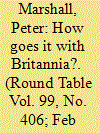

|
|
|
|
|
| Publication |
2010.
|
| Summary/Abstract |
Britain's international involvement has not been diminished by the loss of Empire; but it has altered drastically, in response both to reduced circumstances and to fundamental changes in world conditions. The transition has been made less difficult by the moderation and good sense of Commonwealth partners. It cannot be said to be complete until Britain has found a more satisfactory basis for a productive role within the enlarged EU, an indispensable element in the management of global interdependence. Among the arguments advanced in this article is that Britain's international involvement is not a matter of external policies and priorities alone. It is a function of the soundness of its economy and the strength of its national cohesion.
|
|
|
|
|
|
|
|
|
|
|
|
|
|
|
|
| 14 |
ID:
106213
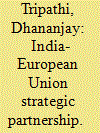

|
|
|
| 15 |
ID:
174570
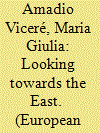

|
|
|
|
|
| Summary/Abstract |
My article addresses the role of the two post-Lisbon High Representatives (HRs), Catherine Ashton and Federica Mogherini, in EU approach to the Eastern neighbourhood. Adopting a broad conceptualisation of EU foreign policy and drawing on the scholarly literature on new intergovernmentalism, it focuses on events that marked the HRs' mandates in the cases of Kosovo and Ukraine. In the case of Kosovo, it examines the HRs' role in the conclusion of the so-called Brussels Agreement (April 2013); and of the August 2015 agreements. In the case of Ukraine, it reconstructs how the HRs dealt with the events leading up to the November 2013 Vilnius Summit; and with those leading up to the conclusion in February 2015 of the Minsk II Agreement. The article argues that the European Council exerts tight control over the post-Lisbon HR, and EU foreign policy-making processes more generally. Nonetheless, the empirical analysis demonstrates that, under certain circumstance, the HR can significantly influence EU foreign policy in the post-Lisbon era.
|
|
|
|
|
|
|
|
|
|
|
|
|
|
|
|
| 16 |
ID:
116291
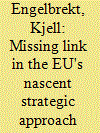

|
|
|
|
|
| Publication |
2012.
|
| Summary/Abstract |
The Lisbon Treaty enacted in 2009 allows the European Union (EU) to adopt a foreign, security, and defense policy with a higher profile. In particular, the High Representative and the European External Action Service are now in a position to conduct a continuous conversation with China, India, Japan, and ASEAN beyond trade-oriented dialogues. But a genuine strategic approach toward Asia requires military expertise so as to adequately assess how to best contribute to stability in this part of the world. Military diplomacy involving individual member states already takes place, yet virtually no information is shared at the EU level. The adoption of a full-fledged strategic approach toward Asia would not only be politically astute and make excellent economic sense; it can also consolidate EU institutions in the realm of foreign, security and defense policy.
|
|
|
|
|
|
|
|
|
|
|
|
|
|
|
|
| 17 |
ID:
120652
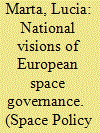

|
|
|
|
|
| Publication |
2013.
|
| Summary/Abstract |
The governance of space activities in Europe remains an open question, even more so since the adoption of the Lisbon Treaty, and the latest EC document and ESA declaration have revived the debate. This paper considers the strengths and weaknesses of the current governance model, and compares recent French, German, Italian and UK national documents in order to highlight their vision of space governance in Europe. Some elements of agreement emerge but, more interestingly, this comparison highlights their differences, especially with regard to the role of the EU as a supranational actor in the space domain.
|
|
|
|
|
|
|
|
|
|
|
|
|
|
|
|
| 18 |
ID:
093555
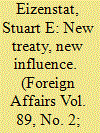

|
|
|
| 19 |
ID:
101137
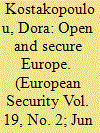

|
|
|
|
|
| Publication |
2010.
|
| Summary/Abstract |
he Lisbon Treaty's depillarisation of justice and home affairs (JHA) cooperation represents a major break from the past. It opens the way for the full involvement of the Commission, the European Parliament and the European Court of Justice, an involvement that is bound to influence the substantive scope, and perhaps liberalise, legal and policy output in the years ahead. A different form of cooperation in area of freedom, security and justice institutionally and substantively is digging out its space within the present, security-oriented and traditionally executive-driven architecture. The Stockholm Programme and the proposed Action Plan are a reflection of this. Present in them are aspects of the Hague Programme and the logic of control and surveillance. But there also exist vessels of less ideology-driven policies, pragmatic responses to JHA challenges and respect for citizens' rights, human rights and the rule of law. Whether the latter paradigm, which is wrapped up within the logic of security, remains confined and crammed in the next five years or will be given room to grow remains to be seen.
|
|
|
|
|
|
|
|
|
|
|
|
|
|
|
|
| 20 |
ID:
104300
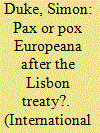

|
|
|
|
|
| Publication |
2011.
|
| Summary/Abstract |
The time is nigh for the EU to think more strategically about its global role. This is suggested by the confluence of changes in the international system itself and the internal changes introduced by the Lisbon Treaty. When approached via a geopolitical prism, the EU's main interests lie in its neighbourhood, to the east and south, central Asia and the Gulf. These are regions where the EU enjoys the most influence. The EU should therefore engage with other international actors, both traditional and emerging, in an intensified dialogue concentrating in particular on these areas. A Union with a clearer idea of what it is trying to accomplish on the world stage, backed by the means and determination to succeed, could herald a regional pax Europeana, while a continuation of the EU's current drift will condemn it to increasing irrelevance - a pox Europeana.
|
|
|
|
|
|
|
|
|
|
|
|
|
|
|
|
|
|
|
|
|